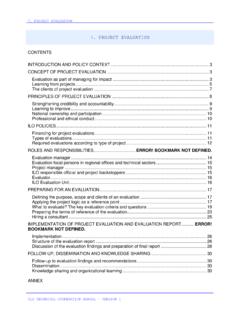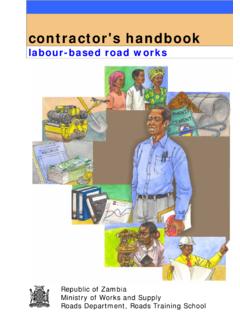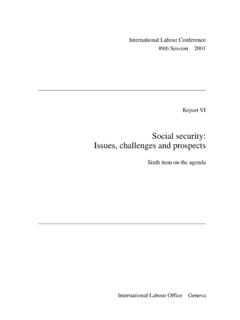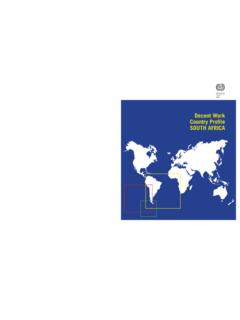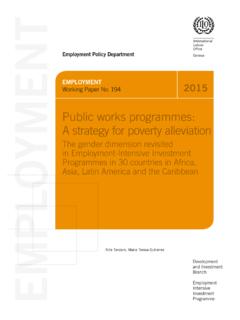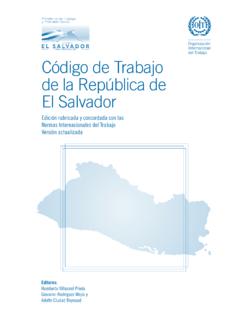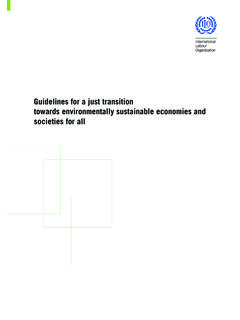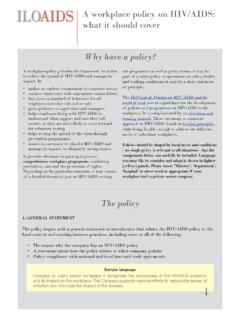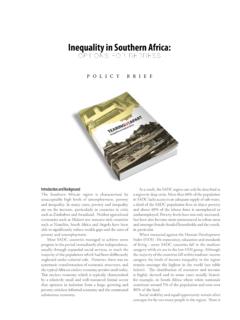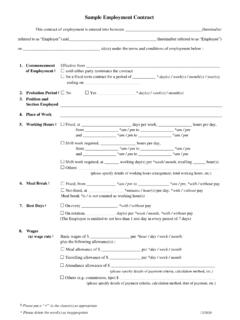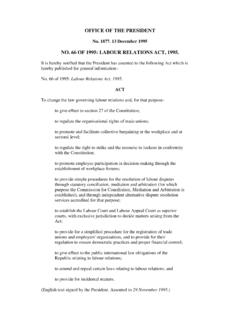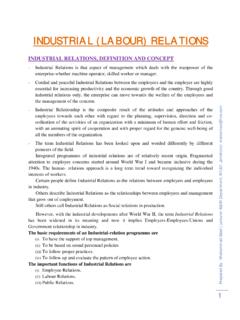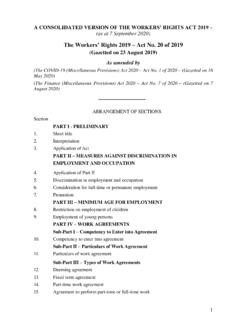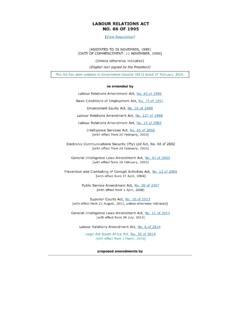Transcription of INTRODUCTION: LABOUR RIGHTS, HUMAN RIGHTS
1 Introduction International LABOUR LABOUR Review, RIGHTS , Vol. HUMAN 137 (1998), RIGHTS No. 2 127. INTRODUCTION: LABOUR RIGHTS , HUMAN RIGHTS . F or those concerned with HUMAN RIGHTS and fundamental LABOUR RIGHTS 1998 is a special year, a year of stocktaking that gives cause both for rejoicing and for alarm. There are still many people whose fundamental RIGHTS are infringed. Armed conflict has not been banished, poverty has not been abolished, nowhere do women enjoy fully equal RIGHTS with men, millions of children LABOUR . Those who 50 years ago had the highest hopes have been deceived.
2 And yet, there have been enormous gains. Few would wish to turn back. Two major international instruments which were adopted in 1948, just 50 years ago, are part of the explanation for the gains which have been realized. First, the Freedom of Association and Protection of the Right to Organise Convention (No. 87) was adopted by the International LABOUR Conference in July, thereby formalizing in international LABOUR law protection of the RIGHTS of workers and employers to associate freely, with- out prior authorization. Then later in that year, the United Nations General Assembly adopted the Universal Declaration of HUMAN RIGHTS , which set a framework for the pursuit of HUMAN RIGHTS globally.
3 This double anniversary would not in itself justify a special issue of the International LABOUR Review on LABOUR RIGHTS and HUMAN RIGHTS . There is a more fundamental purpose behind this issue. It is to explain, to a broader public and to successive generations, something of what these important instruments and especially Convention No. 87 have accomplished and of what they are still capable. They can be strong tools for those who seek to pursue the vision of a world where the humanity and dignity of each person are fully respected. And the prospects have just been given a new impetus.
4 In June 1998 the International LABOUR Conference adopted a solemn Dec- laration on Fundamental Principles and RIGHTS at Work, which not only re- affirms the principles underlying the ILO's fundamental Conventions but provides for the substantial, active promotion of the application of those principles globally, in all member States. The central focus of this special issue is on the instrumental right of freedom of association. There can be little doubt that the freedom to associ- ate with those of one's own choosing, to achieve common ends, is a Copyright International LABOUR Organization 1998.
5 128 International LABOUR Review precious, invaluable right, nowhere more valued than where it is denied. It is proclaimed in the Universal Declaration of HUMAN RIGHTS : Everyone has the right to freedom of peaceful assembly and association (Article 20). It entered into international LABOUR law with Convention No. 87: Workers and employers, without distinction whatsoever, shall have the right to estab- lish and, subject only to the rules of the organisation concerned, to join organisations of their own choosing without previous authorisation (Article 2).
6 Though few now openly oppose the freedom of workers and employers to associate in principle, challenges to it are common in practice. A few may still question the rationality of affording these RIGHTS to all people in their societies, and vigilance is always in order. Without the right to associate, whether exercised or not, the prospects for achieving social justice are poor. There is no need to go back to prehistory to find a world where few had the RIGHTS of free speech, assembly and organization. It was only after the liberation of HUMAN ingenuity from feudal bonds and the emergence of in- dustrial society that some prescient thinkers began to see that respect for HUMAN RIGHTS might be in the general interest.
7 It took much longer before these principles were enunciated internationally. It is only in this century that the process of global institution-building got under way, laying a basis for the international instruments that many now take for granted. And in this, the International LABOUR Organization has played a central role. Fundamental principles of LABOUR RIGHTS and HUMAN RIGHTS are set out in the ILO's Constitution of 1919 and in the Declaration of Philadelphia of 1944 (appended to the Constitution). In particular, the Preamble to the Con- stitution refers to recognition of the principle of freedom of association to confront injustice, hardship and privation.
8 The Declaration of Philadelphia reaffirms that freedom of expression and association are essential to sus- tained progress (Art. I (b)) and constitute a fundamental principle on which the ILO is based. Confronted again with questions as to the relevance and universality of fundamental LABOUR RIGHTS and HUMAN RIGHTS , the International LABOUR Conference has in 1998 declared that all member States have an obligation to respect, to promote and to realize, in good faith .. the funda- mental RIGHTS which are the subject of those [the fundamental ILO] Conven- tions, namely: (a) freedom of association and the effective recognition of the right to collective bargaining.
9 (Art. 2). Remembering that virtually all countries and territories are members of the ILO, and that the number of independent States is enormously greater now than in 1919, this reaffir- mation is indeed noteworthy. It is also necessary. Though 122 of the ILO's 174 member States are bound by Convention No. 87, barely half the world's population lives in countries that have ratified it, and few of the most populous countries have done so. Yet all countries members of the ILO are covered by this 1998. Declaration and its follow-up. The commitment represented by that Declara- Introduction LABOUR RIGHTS , HUMAN RIGHTS 129.
10 Tion in effect raises the cost of infringing fundamental RIGHTS . Not by speci- fying new RIGHTS , but because of the provision for effective follow-up which includes a method of obtaining regular reports on the four areas of core RIGHTS , a requirement that the ILO prepare a global review, and the obli- gation of the ILO to reorient the use of its resources to assist member States in applying these principles. The purpose of the Declaration is to promote respect for fundamental RIGHTS , not to punish failure. Moral suasion backed up by widely shared information can be a powerful incentive.
